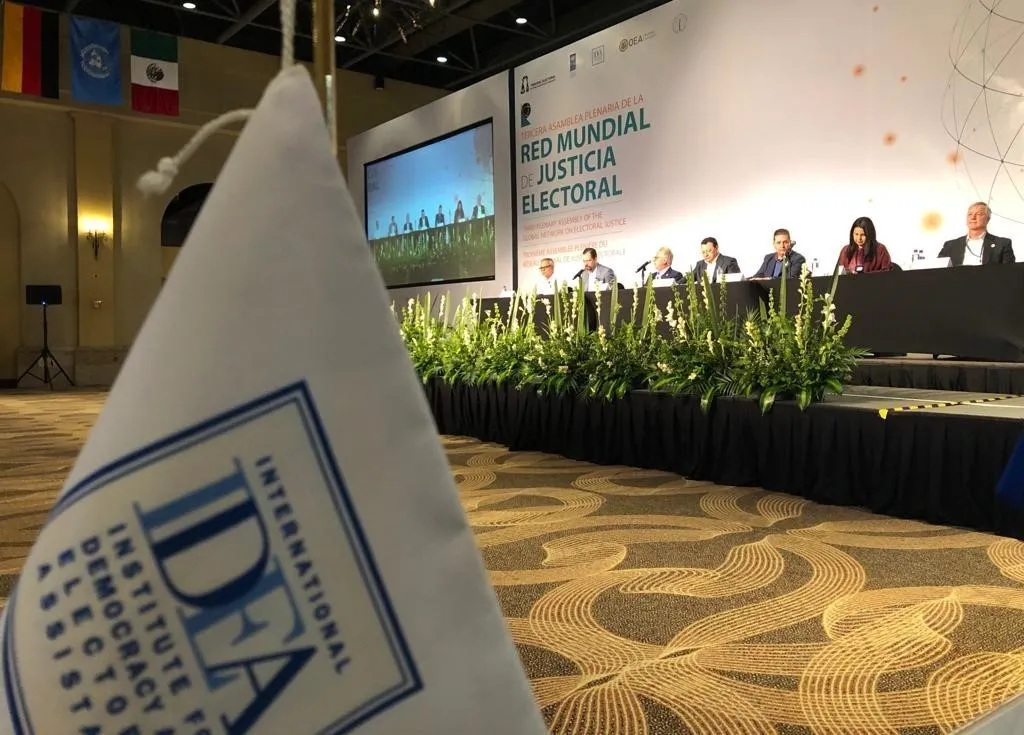Mexico: International IDEA renews commitment to promote access to electoral justice

As a founding member of the Global Network on Electoral Justice, International IDEA addresses electoral justice and equality.
International IDEA’s involvement in the Global Network on Electoral Justice (GNEJ) is a continuation and expansion of our work to promote electoral justice and to foster inclusivity and accountability in electoral processes, with special attention to minority groups. By utilizing our experience, comparative knowledge, pool of experts and indepth recommendations we strive to reinforce the electoral justice agenda through this network by organizing and participating in events, providing advisory services and producing knowledge products and publications. One example of this is the work our subregional office for Mexico and Central America is undertaking in partnership with the Electoral Tribunal of the Federal Judiciary of Mexico (TEPJF).
Since the inception of the GNEJ in 2017, the TEPJF and International IDEA have been key partners with one objective in mind: the effective protection of citizens’ political–electoral rights. As a result, International IDEA and the TEPJF have focused on strengthening and building sustainable practices to protect the political and electoral rights of women, indigenous groups, people with disabilities, and the LGBT community. For instance, the publication of Access to electoral justice in comparative perspective, which highlights good practice and relevant examples of how election dispute resolution bodies (from specialized tribunals to high courts) can guarantee the electoral rights of these groups and individuals.
International IDEA supported the TEPJF-hosted 3rd Plenary Assembly of the GNEJ in Los Cabos, Mexico. More than 115 experts from 32 countries and various judicial and administrative electoral authorities, international organizations, academic institutions and think tanks gathered to address democracy’s most pressing challenges. Some of the institutional participants included the Organization of American States, the UNDP and the International Foundation for Electoral Systems. Moreover, specialists from top universities and think tanks, such as the universities of Lille, Siena and Madrid and the Getulio Vargas Foundation in Brazil joined discussions as part of a cutting-edge scientific committee.
The plenary assembly of the GNEJ was a strategic event not only to discuss the most pressing challenges facing democracy but also, and more importantly, to raise awareness and find solutions for these issues. Therefore, panels and working groups proposed solutions to key areas including equal access to justice, democracy and corruption, democratic disaffection, money in politics, and the participation and representation of minority groups in public decision-making.
During the plenary, Daniel Zovatto, International IDEA’s Director for Latin America and the Caribbean, focused on the main results and findings of the Latin American electoral super cycle, with a special emphasis on the gender parity challenges within the region, noting the absence of women among elected presidents.
Miguel Ángel Lara Otaola, head of International IDEA’s subregional Office for Mexico and Central America, chaired the group on ‘Equality for the political inclusion of vulnerable groups’, where he emphasized the importance of using international law (the Universal Declaration of Human Rights, the International Covenant on Civil and Political Rights and the Convention on the Elimination of all Forms of Discrimination Against Women, amongst others)—which has already been ratified by most countries—to guarantee political and electoral rights at the national and local levels.
International IDEA’s subregional office for Mexico and Central America also regularly shares policy recommendations and position papers on the GNEJ online platform. Since its launch, the office has contributed over 20 articles, notes and policy papers on a range of topics including democratic disaffection, political financing, equal access to electoral justice and political participation, and digital technologies and elections.
Through International IDEA’s involvement in the Global Network on Electoral Justice we inspire electoral assistance practitioners to provide support that is informed by norms, good practices and research on electoral processes.
Read more stories about International IDEA's results in our Annual Outcome Report 2019: Democracy In Action.



